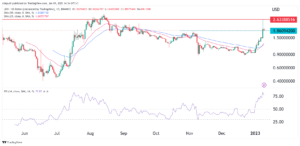Regulation can make consumers more comfortable using cryptocurrency
The sector needs more regulation on stablecoins and spot markets
Crimes like FTX (fraud) don’t need to be addressed by modern policy
Proper crypto regulation could attract more consumers, says Kristin Smith of the Blockchain Association, an entity that advocates for peer-to-peer technology that puts power in the hands of consumers and creators.
Smith talked to CNBC’s Squawk Box Asia about how regulation can make consumers more comfortable using cryptocurrency and can also attract institutions to the industry.
What will the new regime look like?
According to Smith, the collapse of FTX drew attention to the state of the market and how to prevent similar things from happening in the future. She says there were three separate congressional hearings on this subject, but lawmakers walked away with more questions than answers. She added that the sector needs more regulation on stablecoins and spot markets.
Are more laws really needed?
Kristin Smith doesn’t necessarily find that more laws are needed. She said:
FTX was an old fashioned crime, not something that needs to be addressed by modern policy. It does leave Congress with the challenge of figuring out what the gaps are that need to be filled.
The downsides of regulation
CNBC’s host asked whether regulation would take away from the attraction of the crypto market. After all, some of its biggest advantages are associated with privacy and freedom, which regulation can compromise, ultimately making crypto less attractive. Smith responded:
The devil’s in the details. If you look at international markets, you’ll see KYC is usually required. Once you’re in a crypto network, you’re part of the ecosystem, all transactions are recorded on the blockchain. Most transactions are transparent. Regulators are trying to find the right balance. If regulation was done correctly, it would bring more consumers to the crypto space.
The post Blockchain Association: FTX was an “old-fashioned” crime appeared first on CoinJournal.

